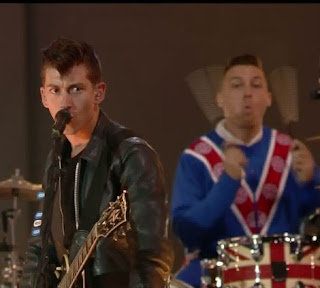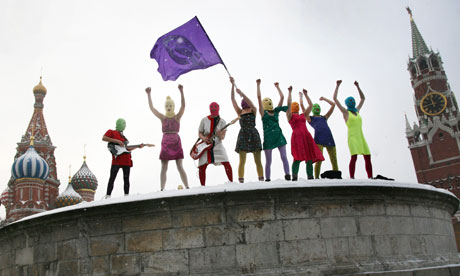So yesterday the band I wrote about in the previous blog just over a month ago (I know, I know, apologies) were sentenced. Two years in a penal colony. Absurd. As Nadia Tolokonnikova's husband, Pyotr Verzilov commented, "What happened now is a clear sign that Russia is moving towards becoming more like China or North Korea".
I'm not going to write up the backstory as I'm sure by now everyone reading this will know about Pussy Riot. There were lots of comments on Facebook and Twitter (but curiously not on my actual blog), about my suggestion of getting a record deal for them to raise awareness but now I'm sure that would have made little difference to the outcome - after all, if you've got the world's biggest stars like Madonna and Paul McCartney publicly showing support and TV news featuring it repeatedly as a lead story then how much more awareness is a hit record going to make? What I haven't read anywhere is how the verdict was timed nicely to occur just after Russia's Olympics result. Is it coincidence that it was left to the post Olympic back-slapping period when Russians and the world might be distracted by the country's triumphant fourth position? The good news is that nobody was distracted.
For those of you who love watching sport - and judging from the Olympics that's pretty much everyone - it's hard to explain how I feel. One analogy might be a deaf person watching others enjoying music: I understand that it's a sheer rush of enjoyment and excitement but I am still left cold. I sat down with my children to watch the 100 metres sprint that Usain Bolt won and I'm glad I did because I could register their own excitement at history being made. But I got this at no more that an academic level. Perhaps my inability to engage with sport is comparable to those people who struggle with humour. For example, the literal mindedness of people on the autistic spectrum or with Asperger's means that they struggle with 'getting' jokes. That's me; I am sportistic. Unfortunately, I don't have any of the compensatory levels of high intelligence and sensitivity in other areas that autistic people do.
It occurs to me that there are some unfortunate people who are like this when it comes to music. They hear it and watch others getting swept away by it and yet it leaves them cold. Even music lovers can relate to this because there is always some music which simply does not do it for them. One man's Revolver is another man's No Parlez. One Tweet I read during the closing Olympic ceremony was that it appeared to be a music concert organised by someone who didn't like music. Now whilst I won't have anything said about The Who at the moment (I am currently going through a massive rediscovery of their brilliance, including finally finishing Tony Fletcher's massive and brilliant Moon biography), I do think that compared to the opening ceremony that this is true: it was a cavalcade of former BRITs winners. At times it felt like I had tuned into one of those I Love The 80s shows. All that was missing was a C-List celeb not born at the time, talking about how much they love the Eurythmics.
There were scant live performances in the opening ceremony but what there was represented a vision - and the choices of song formed part of a tapestry. Danny Boyle's vision was like Grayson Perry's Walthamstow Tapestry: charged with challenging images and juxtapositions (NHS beds, Pretty Vacant in front of the Queen, the industrial revolution vs ecology), the closing ceremony resembled nothing more than a tapestry your auntie might stitch on a Sunday afternoon. No surprise that artistic director Kim Gavin has previous with the BRITS, Take That and many Cowell-related shows. Whilst clearly someone who knows the power of celebrity and glamour, musically it was something that could have been phoned in by someone who buys two CDs a year.
If there are people who like me are tone deaf to sport, or indeed some who are simply unmoved by music itself, then there are of course those who are unmoved by others' suffering. It's just a shame that it is frequently those people, like Vladimir Putin, who take the reigns of power and refuse to let them go.
















